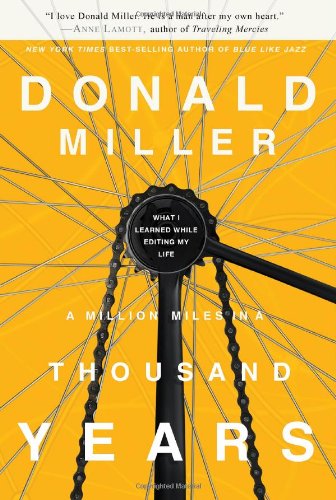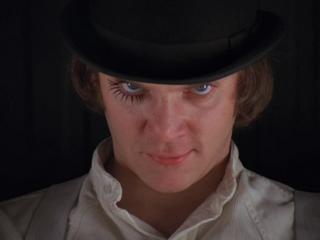This book is...interesting.
It is about story. And Life.
It is about story as life.
Or is it life as story?
I cannot tell.
The premise goes:
- So Donald Miller wrote a book about his early life.
- A couple of film guys read and loved it, called him up to make a film about his life
- They started adapting the book for film
- Changes had to be made
- Donald asked why and they answered:
- "Your story is a great book, but a terrible film"
The biggest problem that Mr. Miller had with their critique of his book?
It was his life they were talking about.
Mr. Miller's life was going to make a boring film.
So they rewrote it.
So here are the basic guiding principles of story that Mr. Miller learned while adapting his life:
- Character is someone who overcomes adversity to get what they want.
- They have to do something good/nice (like save the cat) in the first twenty minutes of the film
- Characters always need an inciting incident
You see, Mr. Miller realized as they started adapting his book for the screen, he could adapt his life for story purposes.
Think about that.
Thoreau has a wonderful quote that I always associated with this, but never thought it had actual practical application:
My life is the poem I would have writ/But, I could not both live and utter it.Our lives are stories that we are all writing while we live them.
So, why are we writing the stories that we are?
Mr. Miller contends comfort.
We are "comfortable" in the lives that we lead.
But, that isn't terribly interesting when it comes to story.
How interesting is it to see people binge watch Netflix for nine hours?
Not very.
But, to see characters overcome adversity repeatedly in the face of overwhelming odds is the stuff of great story.
And so, as they worked to adapt Mr. Miller's book, the writers threw all kinds of obstacles in their character's way.
So Mr. Miller tried it in his own life by introducing our third point: Inciting Incidents
Characters are comfortable at the beginning of stories.
They don't want to travel or do anything too hard (think Bilbo in the Hobbit)
They have their creature comforts.
They are essentially islands.
But, something or someone appears who gives them little or no choice in the matter.
This can be displacement or a disaster or just plain Gandalf:
Anything that forces a character into difficult circumstances.
Why difficult circumstances?
Because that is the only way characters change.
If it wasn't for Gandalf and the trip to the Lonely Mountain, Bilbo would live his days in Hobbiton smoking his pipe and eating his bread.
But, would it be a good story?
Not in the least.
So he signs the contract and is held accountable to its many sections for the rest of the book (stealing, saving dwarfs, and being a certified badass)
So we come to our first point for writing a better story:
1. Introduce Inciting Incidents into your own LifeHow does one do that?
By creating situations you cannot avoid.
Writing your own contracts that other people can hold you accountable for:
Want to write a book?
Introduce a dead line that other people know about
Want to learn a language?
Date someone with a different primary language. (think Love, Actually Colin Firth)
(Why yes I do speak...what was it again? *sips*)
The most important thing about introducing inciting incidents is to tie them to something that matters.
Make it a dream.
Why does Bilbo sign the contract?
Because there is a chance for thrill, adventure, comradery, and treasure!
Don't sign your contracts without something equally as amazing.
Make sure you get something out of your adventure.
But, remember, it will not be easy.
The next part of writing a better story:
2. Embrace antagonismAntagonism/antagonist has a negative connotation in our culture.
Nip that one right in the bud.
Antagonists are antithetical to the protagonist.
They come in a variety of colors and flavors: man, machine, nature, mind, self, etc.
But, what makes excellent story is always the conflict, the antagonistic forces in the universe that we live in.
It wouldn't mean anything if it weren't hard.
It wouldn't be any different from the beginning of the story.
So if you want to write better stories, be ready for a lot of hardship.
By embracing the hardship as a fact of good story, you will be able to face it with the kind of courage that we love in characters like Bilbo.
This next one I am not sure about
3. Be niceThis one may not be necessary.
But, it is true in almost every story and every movie.
Within the first act/part of a story, we witness the protagonist do something like save the cat.
This is so common that it is referred to as just that: saving the cat.
Why?
It is important for the audience to sympathize with the character.
So writers come up with all sorts of ways to implement this including, but not limited to:
- saving a cat from a tree
- defending the nerd from bullies
- killing Hitler
- rescuing orphans from the incinerator (I may be misremembering Annie)
Point is, the stories we love best usually involve a likable protagonist that is able to demonstrate on a fundamental level that they are a good person and have a clear moral stance.
Goku from Dragonball
Superman from Everything
Characters like Aang from Avater: The Last Airbender
This kid is so good he makes the others look like bad guys
Don't believe me yet?
Harry Potter:
Tony Stark:
Rocky:
Now, this isn't absolutely necessary, there are other examples of phenomenal stories with protagonists commonly labelled anti-heroes:
But, uh...
Those don't end well
So, it is probably best to just stick with what you know:
Being a decent all around human being and leave the murder to the sociopaths.
Now, all of this is true for writing story.
These are some of the simplest ways to help characters in your work:
- Identify what they want/need
- Throw obstacles in their way in order to get it
- Watch them struggle
- See how they do at the end and how they are different
But, Donald Miller maintains, and I believe as well, that it is possible to apply some of this process to living a better story.
Now, we are not the authors of our lives (much as we all may like to be).
There are absolutely things outside of our control.
We are characters in our own story...not authorsThat is a very crucial distinction.
For Mr. Miller, the author is God Almighty.
For me, it is trickier; my atheism prevents me from pointing to a single source, but I acknowledge that there may be a Dungeon Master out there beyond my understanding scratching her head over my actions.
Point is, we are not authors.
We are not all powerful.
We cannot just write a new life for ourselves.
But, we can help it along.
- Set yourself up for success by identifying what you want (make it a dream)
- Sign a contract/introduce an inciting incident in order to get it.
- Work towards your goal.
- See how you did/changed
Whether you succeed or fail, you are now a protagonist in your very own story.
How does it feel?
Tell me about it in the comments below.












No comments:
Post a Comment